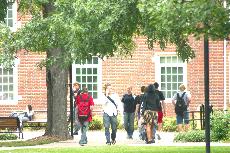Simpson hits retention goal for Fall 2008

September 12, 2008
Approximately 1,028 students will be returning to campus this fall, according to John Bolen, registrar and associate dean.
The statistic is right on target with the school’s goal of retaining around 1,030 students. The retention rate refers to the number of students who return after at least one year at Simpson.
According to Bolen, every year Simpson tries to retain many of their students.
“We’re not going to see a big bump, but we’re at where we expected,” Registrar John Bolen said. “I believe we’re going to hit our budgeted number.”
“Nothing can be gained by getting too many students,” he said. “We know what new students can handle, and how many the campus can handle.”
Jim Thorius, vice president of student development, said that typically around 90 percent of Simpson students return, with the highest retention rate being among the seniors and the lowest being the freshmen.
“The more certain a student is of their educational plans, the more likely they are to persist,” Thorius said. “First year students are often less likely to be clear on their educational and career path. Senior students, on the other hand, have invested three years and have a much clearer sense of career direction.”
Simpson’s sophomores, entering their second year, are retention to have at least an 80 percent retention rate.
Another group of students counted in the report are Simpson’s new transfers, who have been recruited by the college.
“Recruitment is very competitive,” Gwen Schroder, director of transfer enrollment and international recruitment, said. “We try to make it comfortable for the students and stay in touch with them to make a smooth transition.”
This year, the number of transfers recruited was slightly less than previous years.
“We would normally bring in around 80 in the fall and 20- 30 in the spring semester for a total of around 100 per year,” Schroder said. “However, this year it’s less.”
Bolen said that the economy has also been a factor in lower-than-expected retention and transfers.
“I had thought we would go over [our predictions], but as a result of the mitigating economy, and what happened this summer, some students decided not to return,” Bolen said.
Bolen added that despite the problems with the economy, Simpson has managed to do fairly well with retention.
“It seems to me, given the economy, Simpson College has done a good job of retaining our students,” Bolen said.
Former student Colleen Johnson, who attended Simpson last year as a freshman, said her decision to transfer was based solely on her career path.
“I decided that I wanted to major in fashion design, which Simpson doesn’t have as a major,” Johnson said. “It was a really hard decision.”
Johnson, who now attends Columbia College in Chicago, said she was not dissatisfied with her Simpson experience.
“I loved the community feeling,” Johnson said. “I stayed overnight before coming, and between all the professors and the activities, it made me feel like I was a part of everything.”
Johnson said she still misses many parts of Simpson.
“I miss the liberal arts classes,” Johnson said. “It really helped with my confidence.”
Thorius said retention is a very important part of Simpson College.
“It provides a measure of how well the Simpson experience is working for our students and it is important because of how it impacts the overall enrollment,” Thorius said.
He also said that Simpson’s retention, when compared to schools, in the Iowa conference is very strong.
Simpson is also competitive when it comes to attracting high school seniors.
In the Sept. 8, 2008 edition of the Des Moines Register, Simpson was ranked 6th among Iowa schools attracting top in-state graduates.
Ahead of Simpson on the list were the three regent universities, followed by Drake University and Luther College, respectively.
“Simpson has always been known for its academic excellence and highly qualified faculty,” Bolen said. “Simpson College has a very solid reputation with employers and with graduate institutions.”
Thorius agreed with Bolen’s assertions.
“Simpson strives to provide the best educational experience possible to meet the educational, personal and career goals of our students,” Thorius said.












